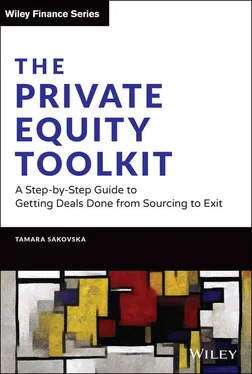Why is it so hard to find proprietary deals? The private equity industry has matured over the years and there are literally hundreds of new funds entering the industry across the globe each year. As information barriers diminish, company owners are getting more sophisticated too, and are far more likely to hire a professional adviser than deal with just one private equity fund in a proprietary transaction. So, why do private equity investors continue to obsess over finding a proprietary deal? Well, everyone likes a competitive sport. Also, finding a proprietary deal is a great opportunity to showcase your professional finesse and highlight your fund's distinct advantage to your LPs. Your fund investors will feel like they have gained access to an exclusive deal club and, provided your fund's returns do not disappoint, will be keen to invest in your next fund when the time comes.
Theoretically speaking, finding a deal outside of a competitive auction should result in a lower entry valuation too. As the only bidder, your fund may avoid having to overpay in order to secure the deal. However, I am not so sure that the notion of a more reasonable entry valuation holds every time. I can think of a number of scenarios in which your fund may decide to pay a fairly high valuation in a proprietary situation. For example, your sector expertise may enable you to take an informed view of unique value creation levers that exist only in this company and not in other comparable businesses. You might decide to pay a premium because your fund may value transaction certainty and seek to benefit from lower execution costs. These are just some of the reasons that might explain a higher entry valuation in a proprietary transaction. Teten and Farmer (2010) remark in their study that sometimes private equity firms agree to pay a higher multiple of earnings for a proprietary deal because it enables them to pursue higher quality targets to begin with and also add more value after the deal closes.
In summary, proprietary deals have become exceedingly difficult to find—but they are not just a myth of the private equity industry. It makes more sense to think of them as an infrequent but completely plausible phenomenon, like a solar eclipse. As rare as they are, we can still expect to experience them once, and hopefully even multiple times during our careers.
Assessment of Your Current Deal Sourcing Capabilities
Let's take an honest look at where you are at the moment. Do you think your firm has strong deal sourcing capabilities? To distinguish good luck from a solid origination process, it might be helpful to think through and answer the following questions.
Does your fund set tightly defined investment goals for the next 12–18 months? Does your firm have a well-articulated sourcing strategy?
Does your firm pursue a research-driven thematic deal sourcing approach? Are there specific investment theses that you are developing in your area of focus?
How many proprietary deals has your firm sourced and what origination strategies were most successful?
Does your firm capture detailed data on the deal pipeline? Are you able to analyze past and current deal flow with basic pipeline key performance indicators (“KPIs”)?
Do you know what proportion of deals your firm has seen that are relevant to your area of focus? How many deals has your firm missed? Of those deals that were missed, how were they sourced? Do you have access to the same deal source?
If your fund saw the deal and rejected it, is there anything in the investment thesis that you failed to detect that other firms were able to spot?
Do you maintain a list of potential deal targets? Do you use a tech-enabled solution that allows you to keep track of them easily? Do you reach out to them consistently and follow up? Do you keep in touch with companies that currently appear to have no interest in selling?
Do you record key takeaways from meetings and calls that various members of your team have had with a potential deal target over the years? Is this information stored centrally and easy to access?
Does your firm have a good system of keeping track and systematizing firmwide relationships, such as with banks, consultants, industry experts and other professional intermediaries? Are you able to rank your relationships based on the value they provide to your firm?
These questions, no doubt, represent a degree of self-reflec-tion and discipline that can seem hard to reach. If your firm does not follow most of these processes, do not worry. These procedures are fairly straightforward to establish and, once in place, they will produce substantial benefits. If your firm already operates in a fairly organized way, then you are already ahead of the game and any incremental deal sourcing efforts should result in an even greater tangible payoff.
Where Do Deals Come From?
Have you ever wondered how a deal actually originates? What factors propel private equity activity? And why do deals come in waves? The reason why I care about these questions is the following: if you understand what emerging trends are likely to spur private equity deal activity in the near future, you can focus your deal sourcing efforts on this arena and position yourself ahead of your competition. In other words, if you are more observant than others, you can try to figure out where deal activity might happen much earlier than anyone else.
One of the intriguing aspects of private equity deals is that they take place in both good and bad market conditions. Theoretically, most private equity deals should happen in a bear market. When the IPO window is closed, the public markets are pessimistic and banks are less willing to provide debt on attractive terms; thus the shareholders of target companies should view private equity as a more appealing financing option. This theoretical argument can be extended further: private equity funds themselves should be able to take contrarian views in a bear market and seek to invest heavily in a down cycle. This will allow them to pay relatively low entry valuations and generate attractive investment returns. Does this happen in reality? Not as often as it should.
My observation is that private equity activity as a whole ends up being quite pro-cyclical. Of course, there are disciplined private equity investors out there who abide by their strict valuation criteria and who avoid investing at the top of the cycle. However, most market participants are human and, therefore, are likely to succumb to hubris when they observe rapid economic expansion and rising stock markets. Valuations are high when the markets are optimistic; however, one can always justify paying a full price for a good business. A deal frenzy begins and eventually swallows the majority of market participants. This explains why deals come in waves.
Since little research exists that links emerging trends to the private equity activity, I found it useful to look at the field adjacent to our industry, namely that of mergers and acquisitions (“M&A”). There is an outstanding book by Bruner (2004) that, in addition to discussing nearly all key areas of applied mergers in impressive detail, addresses precisely this topic. Bruner (2004) looks at what drives the M&A deal activity and identifies areas of “economic turbulence.” Some of these factors provide a good explanation of the private equity deal activity and are useful to keep in mind in your deal sourcing efforts. They are as follows:
Geopolitical change. Political decisions can radically change the attractiveness of certain markets. Any shifts in policy that affect the prosperity of the economy, taxation, social environment and corporate governance will have profound implications for private equity transactions. For example, I owe thanks (and deals) to the following geopolitical developments that influenced my private equity career: the introduction of the single currency in the Eurozone, the inclusion of certain Central and Eastern European states to the European Union, the admission of China to the World Trade Organization as well as market deregulation reforms that followed the economic liberalization in India.
Читать дальше












